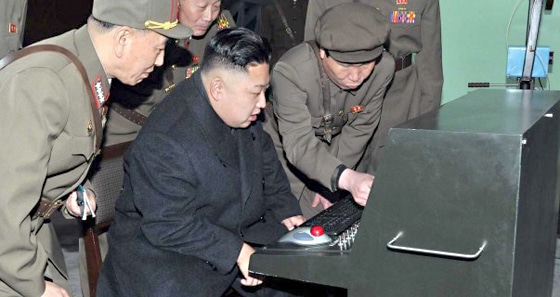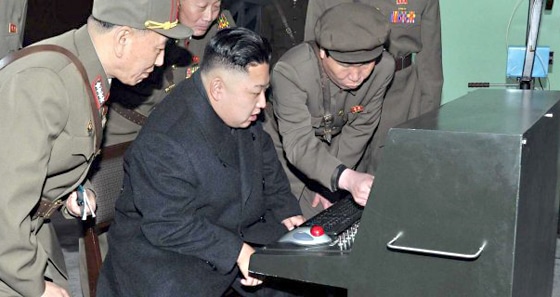
A lot of my job as editorial director of Antiwar.com is cutting through the veil of obfuscation with which the War Party masks its ill intentions. But sometimes you don’t even have to read between the lines to see what our conniving rulers are up to. Such is the case with the current war scare around North Korea.
President Trump is playing this for all it’s worth, summoning the Senate to a special conclave at the White House to inform them of the supposedly dire threat. This ostentatious display was preceded by a hearing before the House Armed Services Committee at which Admiral Harry Harris, in charge of the US Pacific Command, sounded the alarm:
“Kim Jong-Un is clearly in a position to threaten Hawaii today, in my opinion. I have suggested that we consider putting interceptors in Hawaii that . . . defend (it) directly, and that we look at a defensive Hawaii radar.”
The idea that the North Korean despot is going to pull off another Pearl Harbor is so off the wall that one has to wonder what the Admiral is smoking. To begin with, the North Koreans don’t have the technical capacity to reach Hawaii: their most recent test, reportedly of a medium range ballistic missile, failed on launch. Another failure of a medium range missile test occurred earlier in the month, when the rocket went haywire in the skies and exploded in a fiery crash in the sea. And in March, they chalked up two failures, when they fired a flurry of test missiles, only four of which landed 160 miles off the coast of Japan, and another of a medium range missile that “exploded within seconds of launch.”
They didn’t do much better in 2016, with a whole string of failures that limn their infamous 2006 “nuclear” test – which was either a fizzle or a fake.
While Kim Jong-un’s propaganda machine either makes ridiculously inflated claims of its military prowess, or else keeps silent when their missiles explode, the US propaganda machine is working overtime to pump up the alleged threat from Pyongyang. Although there is no evidence to support the claim that these North Korean failures were the result of US sabotage, there’s been much speculation to this effect – a contention that simultaneously inflates both the danger posed by Kim Jong-un’s regime and the supposed near omnipotence of American power.
It’s all hype. North Korea cannot even feed its own people. Despite the seriocomic pretensions of its propagandists, the country’s level of technological development is primitive, at best. A photo of Kim Jong-un sitting in front of a computer that looks like something out of the 1950s is hardly a testament to the wonders of North Korean technology.
Not that the very real possibility of war with North Korea is a laughing matter, but the reality is that the threat is not to the United States. Kim Jong-un can’t hit Hawaii, or the Pacific coast of the United States: however, he can hit Seoul. North Korean artillery are thirty miles away from that city of several million, and within six minutes of the commencement of hostilities the South Korean capital would be engulfed in a sea of fire.
American officials, including the President, keep reiterating that “all options are on the table,” but that’s nonsense: millions would die in the event of war, including most of the 38,000 US troops we have stationed on the Korean peninsula. Trump once proposed withdrawing these sitting ducks, but the outcry from the War Party was so great that he has completely reversed his position. As the McClatchy News piece linked above puts it in the final graph:
After Trump’s election, there had been concerns that he would follow through on campaign threats to withdraw American troops if the two countries don’t pay a larger share of the cost.
There’s no chance of that happening now, and yet the presence of American troops – in effect, an occupying force – is both strategically absurd and the main source of tension on the peninsula. The US presence serves no military purpose, since the North Koreans have the fourth largest army on earth, with over 1 million men at arms. Our soldiers there are merely sitting ducks.
Kim Jong-un, and his father and grandfather before him, have been ranting and raving for decades, vowing to destroy the “imperialists” and threatening to attack the United States. Their crazy rhetoric, however, is not backed up by anything approaching a credible means to accomplish that goal: it’s pure bluster, meant to frighten their own people into submissiveness and deter an attack on their own territory. However, they do pose a very real threat to South Korea, which will be the battleground in any conflict between the Communist regime and the US. What’s amazing, at least to me, is the willingness of US officials to repeatedly state that the possibility of war is “on the table” without any regard for the fate of the South Koreans, who would be the main victims of such a horrific eventuality.
Indeed, resentment of the US military presence is widespread. This may have something to do with the flippant manner with which Washington treats the “option” of sacrificing millions of South Koreans without a second thought. As Trump bellowed belligerently over Twitter, declaring that the US would “take care of the problem” if China failed to do so,” fear spread throughout South Korea that war was imminent. The remarkable tone deafness of the Americans was criticized by the leading candidate for the South Korean presidency, Moon Jae-in, who had this to say:
The safety of South Korea is as important as that of the United States. There should never be a preemptive strike without South Korean consent.
Moon, who is ahead in the polls, is likely to be the next President of South Korea. He has pledged to restore the so-called “Sunshine Policy,” visit North Korea, establish economic relations, and work toward a negotiated settlement with the North. This is in direct contradiction to the statements of Vice President Mike Pence, who announced on his recent trip to the region that “the era of strategic patience is over.” He might want to ask the South Korean people about that.
Reprinted with permission from Antiwar.com.

